Guy Bartholomew
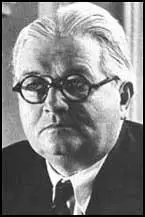
Guy Bartholomew, the elder of two sons of Henry Bartholomew, a warehouseman, and his wife, Kate Shackall, who taught singing, on 17th October 1884 at 191 Belsize Road, Hampstead, London. "Partly out of mischief and partly because he thought that it was commercially advantageous, he sometimes pretended to be Jewish. He never publicly dismissed the implausible suggestion that he was the illegitimate son of... the press baron Lord Northcliffe, whose features and mannerisms he shared." (1)
Bartholomew's education was "elementary and perfunctory" (2) At the age of 14 he became an office boy at the Illustrated Mail. He appears to have impressed proprietorAlfred Harmsworth, who paid for him to attend classes at the Slade School of Art. On his return he worked in the engraving department before moving to the recently established Daily Mirror in January 1904. (3)
The newspaper had been established by Alfred Harmsworth and Harold Harmsworth "for gentlewomen". Kennedy Jones was put in charge of the project and spent £100,000 in publicity, including a gift scheme of gilt and enamel mirrors. Mary Howarth, was appointed editor, and most of its staff were women. The first issue was published on 1st November, 1903. Harmsworth wrote in his diary that "after the usual pangs of childbirth produced the first copy at 9.50 p.m. It looks a promising child, but time will show whether we are on a winner or not." (4)
The new paper provided twenty tabloid-sized pages at a cost of a penny. Harmsworth declared in the first issue that "the Daily Mirror was new, because it represents in journalism a development that is entirely new and modern in the world; it is unlike any other newspaper because it attempts what no other newspaper has ever attempted. It is no mere bulletin of fashion, but a reflection of women's interests, women's thoughts, women's work. The sane and healthy occupation of domestic life." (5)
On its first day, the circulation of the Daily Mirror was 265,217. This was mainly as a result of a massive publicity campaign. Silly mistakes were made. For example, one regular column, "Our French Letter" had to be changed to "Yesterday in Paris". Sales dropped dramatically after the initial launch and within a month circulation was below 25,000 and losses were £3,000 a week. "The paper became the greatest publishing blunder of Alfred's career and lost £100,000 before its fortunes were righted. The original idea - that a large female readership could be lured to a penny paper away from sixpenny productions like the Queen and Ladies' Field - proved absolutely wrong." (6)
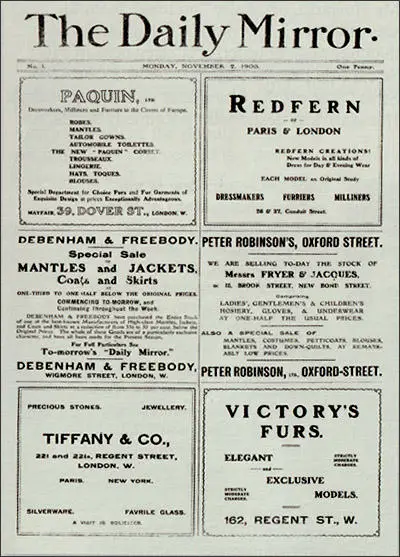
Alfred Harmsworth was strongly opposed to women's suffrage and women who wanted careers and so he was very keen to produce a newspaper that did not to appeal to the "naughty New Woman who smoked cigarettes and had unthinkable notions about the vote". Harmsworth hoped his new newspaper "would attract bright, home-loving ladies, who in turn would attract advertisers of clothes, jewellery, and furniture." (7)
Matthew Engel, the author of Tickle the Public: One Hundred Years of the Popular Press (1996) has argued that the "Daily Mirror did not have the same only-just-out-of-reach aspirational appeal that made the Daily Mail such a success in the suburbs." (8) Maurice Edelman was convinced the disaster was not so much a miscalculation of the market as a result of Harmsworth's Oedipal obsession: subconsciously, he was starting a paper that would please his mother." (9)
Harmsworth had a patronising and sententious attitude towards women: "Nine women out of ten would rather read about an evening dress costing a great deal of money - the sort of dress they will never in their lives have a chance of wearing, than about a simple frock such as they could afford. A recipe for a dish requiring a pint of cream, a dozen eggs, and the breasts of three chickens pleases them better than being told how to make Irish stew." (10)
In 1904 Alfred Harmsworth decided to change his original plan. The editor, Mary Howarth, returned to the Daily Mail and was replaced by Hamilton Fyfe, who had orders to sack the women on the staff. "They tried to soften Fyfe's heart by leaving presents on his desk; he said it was like drowning kittens." These changes did not work. Circulation was 45,000 when Fyfe took over; by the end of the year it had lost a third of this and was only selling 30,000 copies. (11)
Guy Bartholomew and the Daily Mirror
Hannen Swaffer was the newspapers first Art Editor and Guy Bartholomew became his assistant. By the time of its first birthday, the newspaper was selling 290,000 copies. Bartholomew was accomplished artist and cartoonist, and above all, a brilliant picture editor, and played an important role in the success of the newspaper. On 20th December 1906 Bartholomew married a widow from Scotland, Bertha Broome, who was seven years older than him. (12)
The work of Swaffer and Bartholomew became more important after Alfred Harmsworth announced a change of strategy: "I had for many years a theory that a daily newspaper for women was in urgent request, and I started one. The belief cost me £100,000. I found out that I was beaten. Women don't want a daily paper of their own.... I then changed the price to a halfpenny, and filled it full of photographs and pictures to see how that would do. It did." (13)
As the quality of reproduction of photographs improved, the sales of the newspaper increased. On 21st May 1910 the Daily Mirror created a journalistic sensation when it published a photo of the dead King Edward VII lying on his bed in Buckingham Palace. "Public reaction was predictable: shock, horror, outrage and a stampede to buy copies at the newsagents. The coup revealed the public's morbid fascination for celebrated corpses." (14)
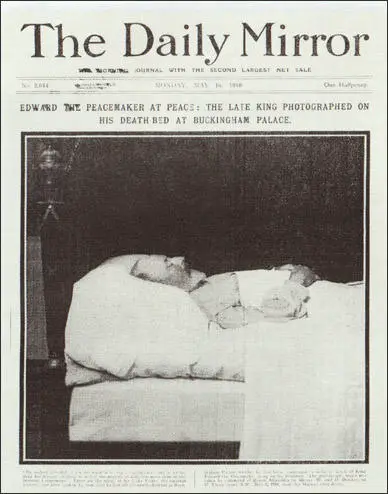
Complaints that the Daily Mirror had displayed atrocious taste by intruding on private grief were undermined when Hannen Swaffer, the newspaper's Art Editor, provided information on how the photograph was obtained. Swaffer heard about the picture while drinking beer in a public house. He claimed that he had offered £100 to ask Queen Alexander if the paper could publish it. According to Swaffer's account, the Queen replied, "It can only go in one paper, the Mirror, because that is my favourite." (15)
Alfred Harmsworth, Lord Northcliffe, complained to the editor of the Daily Mirror about the staff of the newspaper. "Someone told me the other day that your people were all Socialists." (16) In January 1914, preoccupied with The Times and the Daily Mail, two best-selling right-wing newspapers, Harmsworth sold his share of the Daily Mirror to his brother Harold Harmsworth. Alfred later claimed that he had been uncomfortable with the frequent light-heartedness of the newspaper. At the time the newspaper was selling an average of 1,210,354 copies every day. According to Hugh Cudlipp, Harold was "a money maniac who regarded the newspaper and its companion the Sunday Pictorial as sources of funds to invest elsewhere." (17)
Bartholomew, who was appointed as a director of the newspaper, when only 28 years-old, and by which time he had already played a key role in creating the Daily Mirror as a mass circulation title, well equipped to report the First World War in unusually graphic and striking fashion. Adrian Smith has pointed out: "A courageous battlefield photographer, an accomplished artist and cartoonist, and above all, a brilliant picture editor, Bartholomew had technical ability that extended to a key role in developing the Bartlane process of telephoto transmission." (18)
First World War
In 1914 the newspaper sent correspondents and photographers to Europe. However, Lord Kitchener, the War Minister, was determined not to have any journalists reporting the war from the Western Front. He instead appointed Colonel Ernest Swinton, to write reports on the war. News photographers were also not allowed near the front-line. The Daily Mirror encouraged soldiers to take photographs by offering cash prizes for readers' best war pictures and it pulled off a major scoop by publishing the first pictures of a tank in action. (19)
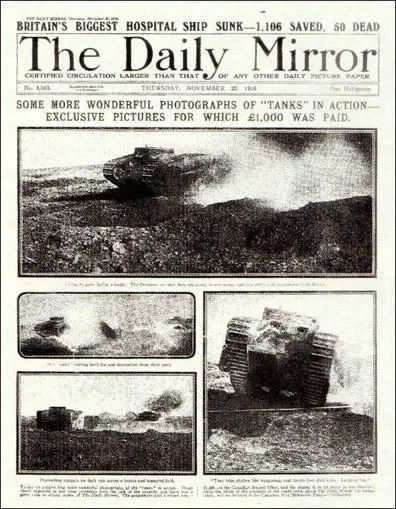
Bartholomew applied to join the Royal Flying Corps but was turned down by because of his poor eyesight. He decided to become a war photographer and with the help of Lord Beaverbrook, he joined the Canadian Army. Bartholomew's photographs were published in the Daily Mirror and exhibited at the Imperial War Museum. After the war he returned to the newspaper and is credited with developing the Bartlane Process of picture transmission that enabled images to be transmitted across the Atlantic in less than three hours. By March 1922, the newspaper was selling 3,005,430 copies a day. (20)
Alfred Harmsworth, Lord Northcliffe, died in August 1922. His brother, Harold Harmsworth, Lord Rothermere, now took full control of the Daily Mail as well as the Daily Mirror. He also ran the Evening News, the Sunday Pictorial and the Sunday Dispatch. Rothermere set up the Daily Mail Trust as a public company to run the newspapers. His main rival was Maxwell Aitken, Lord Beaverbrook, who owned the other large selling newspaper, the Daily Express. "To ensure that the two proprietors thought twice about cutting one another's throats, Beaverbrook took a large stake in the Daily Mail Trust, and the Trust acquired a considerable holding in the Express." (21)
Rothermere held strong anti-trade union views and the Daily Mirror gave its full support to the government during the General Strike. On 5th May, 1926 it stated: "The Daily Mirror calls upon its readers to do all in their power to support the Government." (22) The newspaper denounced the strikers and warned the Government not to surrender. "The people expect the Government not to fail in its duty. If the Cabinet surrenders, democratic government will be forever impossible in this country." (23)
Rothermere also gave his support to fascists in Europe including Benito Mussolini in Italy and Adolf Hitler in Germany. He spoke in glowing terms of Mussolini throughout the 1920s and celebrated ten years of his dictatorship as "the greatest evolution of the last decade of world history... that regeneration of the national genius of Italy". (24) Lord Rothermere believed that "Fascism, in Italy as elsewhere, was portrayed as the bastion of hope against the Bolshevik menace." (25)
Lord Rothermere wrote that Lenin, the leader of the Russian Revolution was a criminal who "took hold of a backward country and smashed it to pieces" whereas he argued that Mussolini's Fascists were "manifestly inspired by more exalted motives... This young, vigorous, ardent Italian did more than save Italy. In my judgment he saved the entire Western world." (26)
Editorial Director of the Daily Mirror
In March 1931 he began selling off his shares in the Daily Mirror and the Sunday Pictorial. Bartholomew was appointed editorial director of the newspaper in November, 1933. His first front cover was a man being lynched in California. Donald Zec has argued that Bartholomew was regarded as the father of Britain's tabloids. "His formula was roughly, sex, sincerity and sensation." (27) He was described by colleagues as "illiterate and drunk" and "semi-literate and half-pissed". Other members of his staff considered him a genius and in the words of Edward Pickering, a sub-editor at the newspaper, Bartholomew had "an extraordinary flair for conveying his enthusiasm." (28)
Bartholomew was as interested in content as layout, having a clear notion of how the newspaper "could emulate New York's sensationalist tabloid dailies without necessarily sacrificing its integrity and sense of purpose". With the support of Cecil King, one of the directors of the newspaper, he decided to change its market strategy. "They aimed to attract fresh advertising revenue by targeting young working-class readers with disposable income, and set about transforming it into an American-style tabloid, staffed by a highly professional team of young editors, designers, and reporters." (29)
Lord Rothermere still owned a significant number of shares in the Daily Mirror and had enough power to publish an article in praise of Oswald Mosley and the The British Union of Fascists (BUF) in January, 1934: "At this next vital election Britain's survival as a Great Power will depend on the existence of a well-organised Party of the Right, ready to take over responsibility for national affairs with the same directness of purpose and energy of method as Mussolini and Hitler have displayed.... That is why I say Hurrah for the Blackshirts! ... Hundreds of thousands of young British men and women would like to see their own country develop that spirit of patriotic pride and service which has transformed Germany and Italy. They cannot do better than seek out the nearest branch of the Blackshirts and make themselves acquainted with their aims and plans." (30)
The sales of the Daily Mirror was now down to around 700,000 and Lord Rothermere feared it was going to go out of business and sold his remaining shares and those held by the Daily Mail Trust in 1935, totally severing his connection with the company. Bill Hagerty has commented: "Rothermere was a sad and unfulfilled man whose 17 year stewardship of the paper had seen it transformed from a groundbreaking, vital young buck of communication and entertainment to a prematurely middle-aged, middle-class dullard." (31)
At first the Daily Mirror remained a fairly conservative newspaper and advocated a negotiated agreement with Adolf Hitler. Like most other newspapers it supported Stanley Baldwin and Neville Chamberlain in its government's policy of appeasement. "Who will be caught again by lying twaddle about war to end war, and about our sacred honour and our solemn oath? The futile pacts and obsolete treaties may lie in pieces wherever Hitler or anybody else has thrown them. Better flimsy fragments of imbecile documents on the ground than millions of rotting bodies of young men... The time has ended for the making of further pacts, guarantees, agreements, understandings and whatnots in defence of an impossible system, which seeks to perpetuate the ludicrous settlement of the revengeful post-war years. Those arrangements still divide Europe into water-tight compartments of victors and vanquished, the satiated and the rebellious." (32)
In 1936 Bartholomew, with the support of Cecil King, one of the directors of the newspaper, decided to change its market strategy. "They aimed to attract fresh advertising revenue by targeting young working-class readers with disposable income, and set about transforming it into an American-style tabloid, staffed by a highly professional team of young editors, designers, and reporters." (33) Bartholomew was also responsible for the newspaper "becoming the champion of, the working and lower middle-classes". (34)
King brought in the J. Walter Thompson, the world's leading advertising agency to help them with its marketing. They pointed out that the newspaper should be designed for the longer commuting distances that were becoming increasingly common. Thompson's support was as important as their guidance, because it meant that the newspaper could depend on the backing of the advertisers as it took what might otherwise have been a very risky venture. (35)
It was the outbreak of the Spanish Civil War, that established another fascist dictator-state in Europe that resulted in a change of approach. Bartholomew, who hated the arrogance and snobbery of the upper classes, encouraged the editorial staff to develop an anti-establishment tone. In 1937 Basil Nicolson, was hired as features editor. Nicholson recruited Philip Zec as the paper's political cartoonist and William Connor, who wrote a forthright column under the name Cassandra. (36)
Hugh Cudlipp, a young journalist with socialist views later explained, was also recruited: "Roy Suffern evolved and ran the news pages... I ran the features. The leader writer, Richard Jennings, wrote his own editorials. Cassandra (William Connor) edited his own column and Philip Zec evolved his own cartoons, collaborating with Cassandra on the captions. If there was a master-mind, or even two master-minds, behind the operation it was not readily apparent to the guerrillas who were were aiming the hand grenades and holding up to the public to ransom." (37)
Zec's cartoons were an immediate success with the readers. Zec, who was Jewish, felt passionately about the need to defeat Adolf Hitler, a produced a series of powerful cartoons against the Nazi government. As his brother, Donald Zec, pointed out: "He presented Hitler, Goering, and others in the Nazi hierarchy as strutting buffoons. Replacing ridicule with venom, he often drew them in the form of snakes, vultures, toads, or monkeys. Not surprisingly, captured German documents listed Zec's name among those to be arrested immediately England had fallen." (38)
Richard Jennings, deeply influenced by the ideas of William Morris, wrote the editorials. Columnists like William Connor, were constantly inviting reader response and correspondence columns expanded to accommodate those anxious to obtain advice or to express political views. Philip Zec's cartoons became an important part in the way the newspaper developed a social conscience and during the late 1930s he became the "country's foremost and most notorious political cartoonist." (39)
Second World War
The newspaper now took a strong anti-fascist stance. William Connor visited Nazi Germany in 1938 and reported: "Before this visit to Germany I always had a sneaking feeling that there was a strong undercurrent of opposition to Hitler. I am now certain that I was wrong. I know now that this man has the absolute unswerving confidence of the people. They will do anything for him. They worship him. They regard him as a god. Do not let us deceive ourselves in this country that Hitler may soon be dislodged by enemies within his own frontiers. Germans regard him as the greatest figure in their history. Better and greater than Bismarck. Infinitely superior to Frederick the Great." (40)
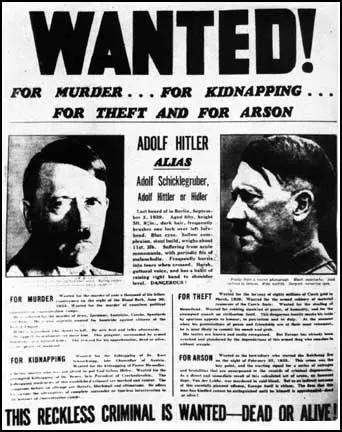
Philip Zec's developed a reputation as "the people's cartoonist" and was often willing to point out government incompetence. At a War Cabinet meeting on 7th October, 1940, Winston Churchill, raised the issue of articles and cartoons being published in the Daily Mirror and the Sunday Pictorial. Churchill claimed: "The immediate purpose of these articles seemed to be to affect the discipline of the Army, to attempt to shake the stability of the government, and to make trouble between the government and organised labour. In his considered judgment there was far more behind these articles than disgruntlement or frayed nerves. They stood for something most dangerous and sinister, namely, an attempt to bring about a situation in which the country would be ready for a surrender peace." (41)
Churchill asked who owned these newspapers. Sir John Anderson replied: "The Daily Mirror and the Sunday Pictorial were owned by a combine. A large number of shares were held by bank nominees, and it had been possible to establish which individual, if any, exercised the controlling financial interest of the newspaper. It was believed, however, that Mr I. Sieff (Israel Sieff, English businessman and Zionist and later chairman of the British retailer Marks & Spencer) had a large interest in the paper, and that Mr Cecil Harmsworth King (Cecil King, director of both newspapers) was influential in the conduct of the paper." Anderson went on to argue that "it would be wrong to attempt to stop publication of these articles by a criminal prosecution in the Courts." (42)
As Wilfrid Roberts, the Liberal Party MP pointed out: "The Daily Mirror belonged originally to Lord Rothermere. About ten years ago, Lord Rothermere sold his shares, gradually, on the Stock Exchange. They were brought up in small blocks. There is no big, or controlling, group of shares now held by one person. The shares held by nominees represent only between five and ten per cent of the whole shareholding of the paper. In other words, this paper, unlike many others, is run by a board of directors and a chairman. The Daily Mirror has not changed (its policy) in the last five or six years. Its staff has not changed, since the time when the Prime Minister wrote for it." (43)
Clement Attlee offered to speak to Bartholomew and Cecil King, two of the senior figures at the newspaper group. They met on 12th October, 1940, in an air raid shelter used by government ministers. King recorded in his diary that Attlee told them that the government believed that the newspapers showed a subversive influence which might endanger the nation's war effort. "I asked him to give an example. He said he couldn't think of one... Attlee was critical but so vague and evasive as to be quite meaningless. We got the impression that the fuss was really Churchill's, that Attlee had been turned on to do something he was not really interested in, and had not bothered to read his brief." (44)
Winston Churchill and Philip Zec
Bartholomew was appointed as chairman of the company publishing the Daily Mirror. A few days later the newspaper published a cartoon by Philip Zec on the government's decision to increase the price of petrol. The cartoon showed a torpedoed sailor with an oil-smeared face lying on a raft. The journalist, William Connor, provided the caption: "The price of petrol has been increased by one penny. Official." As Angus Calder pointed out: "While many readers seem to have accepted this at its face value as an injunction that they should not complain about shortages and rising prices at such a time as this, Morrison took it to mean that seamen were risking their lives for profiteers at home. Ernest Bevin agreed with him, and Churchill wanted instant suppression of the paper." (45)
Zec later pointed out that the cartoon was part of a series about the black market and the dangers of wasting food or petrol. (46) The first cartoon had shown a black marketer placing flowers on the tomb of a dead soldier saying: "Poor fellow, now what can I sell his mother?" The second had emphasized the importance of not wasting food. The third in the series, was to make people aware that every drop of petrol was precious. Zec was trying to say that lives were being lost bringing tankers to Britain and that wastage was thus immoral." (47)
Philip Zec, The Daily Mirror (5th March, 1942)
The same issue carried an editorial which mocked the army's leaders as "brass buttoned, boneheads, socially prejudiced, arrogant and fussy with a tendency to heart disease, apoplexy, diabetes and high blood-pressure." (48) Winston Churchill believed that the cartoon suggested that the sailor's life had been put at stake to enhance the profits of the petrol companies. "It was, he declared, bound to have a strong effect in deterring seamen from agreeing to serve on oil tankers. The leading article he regarded as a gross and improper libel on the higher officers in the army, and incidentally on the government which appointed them, and one calculated to spread alarm and despair in the ranks and make men unwilling to fight in the belief that they were being led to their deaths by aged and stupid incompetents." (49)
In the House of Commons, Herbert Morrison, the Home Secretary, called it a "wicked cartoon" and Ernest Bevin, the Minister of Labour, argued that Zec's work was lowering the morale of the armed forces and the general public. By 18th March, 1942, the Law Officers advised Morrison that the cartoon and articles published by the newspaper were infringements of regulation 2D. However, Morrison decided against this after one of his advisers claimed that the newspaper's "criticisms simply reflected real and widespread disenchantment with the government and that it would be very imprudent to hit out at the mouth-piece for genuine popular feeling." (50)
Churchill arranged for MI5 to investigate Zec's background, and although they reported back that he held left-wing opinions, there was no evidence of him being involved in subversive activities. Bartholomew and Cecil Thomas were ordered to appear before Morrison at the Home Office. Zec's cartoon was described as "worthy of Goebbels at his best" and turning on Thomas, Morrison told him that "only a very unpatriotic editor could pass it for publication". Morrison informed Bartholomew that "only a fool or someone with a diseased mind could be responsible" for allowing the Daily Mirror to publish such material. (51)
In his autobiography, Hugh Cudlipp thought that the government treated Zec very badly: "Unpatriotic? Frayed nerves had led to distorted judgement. Philip Zec was a socialist, and therefore passionately anti-Nazi. He was also a Jew, and passionately anti-Hitler. Helping the enemy? When the German High Command papers, or such as were available, were examined by the Allies after the war, a document was disclosed which reduced to fatuity the view of the British War Cabinet about the Mirror and Pictorial at the end of 1940, the beginning of 1941, and the spring of 1942. The document was an order that all Mirror directors were to be immediately arrested when London was occupied." (52)
When Anueurin Bevan heard that the government was considering closing down the Daily Mirror he forced a debate on the issue in the House of Commons. Some MPs were appalled when Herbert Morrison suggested that the newspaper might be part of a fascist plot to undermine the British Government. Several pointed out that the Daily Mirror had been campaigning against fascism in Europe since the early 1930s. In doing so, it had supported Churchill and Morrison in their struggle against appeasement, the foreign policy of Neville Chamberlain's government. (53)
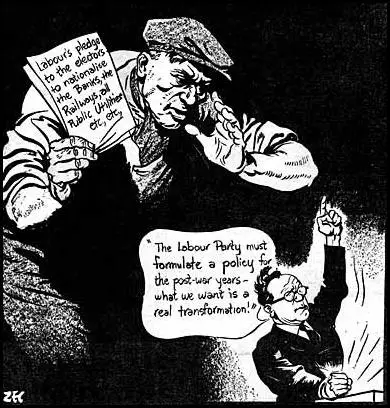
Anueurin Bevan argued in the debate that: "I do not like the Daily Mirror and I have never liked it. I do not see it very often. I do not like that form of journalism. I do not like the strip-tease artists. If the Daily Mirror depended upon my purchasing it, it would never be sold. But the Daily Mirror has not been warned because people do not like that kind of journalism. It is not because the Home Secretary is aesthetically repelled by it that he warns it... He (Morrison) is the wrong man to be Home Secretary. He has for many years the witch-finder of the Labour Party. He has been the smeller-out of evil spirits in the Labour Party for years. He built up his reputation by selecting people in the Labour Party for expulsion and suppression. He is not a man to be entrusted with these powers because, however suave his utterance, his spirit is really intolerant. I say with all seriousness and earnestness that I am deeply ashamed that a member of the Labour Party should be an instrument of this sort of thing. How can we call on the people of this country and speak about liberty if the Government are doing all they can to undermine it? The Government are seeking to suppress their critics. The only way for the Government to meet their critics is to redress the wrongs from which the people are suffering and to put their policy right." (54)
The majority of MPs were firmly behind Morrison and therefore no vote was taken over the issue. The press, understandably, was least happy with him. The Times, Manchester Guardian, News Chronicle and the Daily Herald objected to the way he had threatened to use defence regulation 2D against government critics. The National Council for Civil Liberties also expressed grave concern and organized a mass protest meeting in London in April. It has been argued that "it was not a happy experience for Morrison, to be pilloried as an enemy of civil liberties when he had fought so long behind the scenes to protect the freedom of the press." (55)
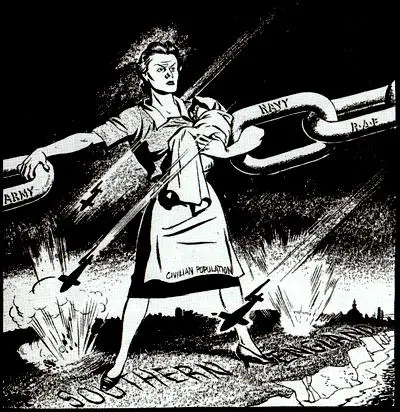
Bill Hagerty has argued that during the Second World War Philip Zec became the most important figure in the newspaper: "His cartoons continued to dominate the slim issues of a Mirror that had become the People's Paper and, most importantly, the paper of the serving soldier, sailor and airman... A socialist and a Jew... he had been attracted to newspapers as a means of expressing his strong political and social beliefs." (56)
1945 General Election
On 7th May 1945, General Alfred Jodl and Admiral Hans-Georg von Friedeburg (chiefs of the German Army and Navy, respectively) signed the unconditional surrender of the German forces at the headquarters of General Dwight D. Eisenhower at Rheims. It was agreed that hostilities would cease officially the following day. On 8th May, the British and Americans celebrated Victory in Europe Day. Philip Zec marked the occasion with a message to future British politicians: "Here you are! Don't lose it again!". (57)
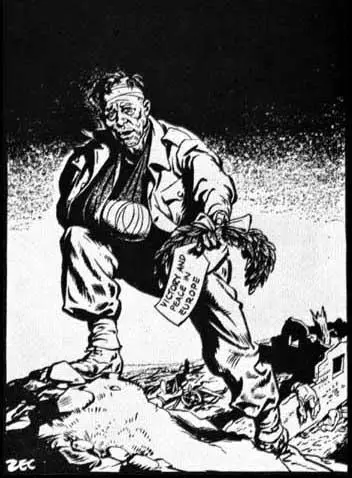
Philip Zec, The Daily Mirror (8th May, 1945)
It has been argued that Zec's cartoon "ranks among the greatest he ever drew and, for old soldiers and sentimentalists, can still bring a lump to the throat almost 60 years later." Two days after it appeared, the Daily Mirror adopted a new slogan, which would appear under its masthead in every issue for the next 15 years and encapsulate the paper's relationship with its readers: "Forward with the People". (58)
Winston Churchill resigned as Prime Minister and requested the dissolution of Parliament on 23rd May, 1945. In the last General Election it had supported Stanley Baldwin and the Conservative Party. This time it was going to be very different. It campaigned very strongly for the Labour Party and unlike most newspapers, gave its full support to the implementation of the Beveridge Report that "the proposals for social security" that "marks a big step forward in the social reconstruction of the country". (59)
On the day of the 1945 General Election, the Daily Mirror reproduced Philip Zec's VE-Day cartoon of a bloodied and bandaged soldier thrusting a victory laurel wreath. Next to it was an article calling for the people to vote for the Labour Party: "We reproduce on this page Zec's famous VE-Day cartoon. We do so because it expresses more poignantly than words could do the issues which face the people of this country today... Vote on behalf of the men who won the victory for you. You failed to do so in 1918. The result is known to all. The land 'fit for heroes' did not come into existence. The dole did. Short-lived prosperity gave way to long, tragic years of poverty and unemployment. Make sure history does not repeat itself." (60)
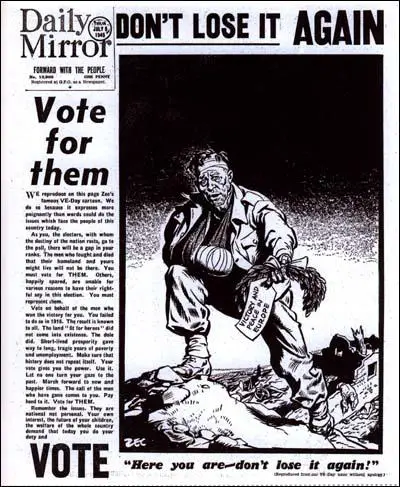
A copy of this newspaper can be obtained from Historic Newspapers.
Roy Greenslade has argued: "The slogan was cleverly aimed at the wives, girlfriends and mothers of servicemen abroad, many of whom were voting for the first time. They would, naturally, wish to do well by the men yet to return, many of whom were angry that they would have no opportunity to vote. The slogan was cleverly aimed at the wives, girlfriends and mothers of servicemen abroad, many of whom were voting for the first time. They would, naturally, wish to do well by the men yet to return, many of whom were angry that they would have no opportunity to vote. The slogan also gave political expression to the demobbed troops worried about their futures and, with great subtlety, tapped into the sense of comradeship they had experienced. The vote was for others, not just for oneself." (61)
When the poll closed the ballot boxes were sealed for three weeks to allow time for servicemen's votes (1.7 million) to be returned for the count on 26th July. It was a high turnout with 72.8% of the electorate voting. With almost 12 million votes, Labour had 47.8% of the vote to 39.8% for the Conservatives. Labour made 179 gains from the Tories, winning 393 seats to 213. The 12.0% national swing from the Conservatives to Labour, remains the largest ever achieved in a British general election. It came as a surprise that Winston Churchill, who was considered to be the most important figure in winning the war, suffered a landslide defeat. It was suggested at the time that the Mirror's "Vote For Him" campaign "may well have won more votes for the Labour party than any other journalistic enterprise". (62)
After the war Bartholomew began to drink heavily. Hugh Cudlipp pointed out: Bart, nearly seventy, was increasingly irascible, grotesquely unjust and was hitting the bottle. He was occasionally incoherent and frequently unreliable." This sometimes clouded his judgement and in December, 1948 Bartholomew, sacked Cudlipp as editor of the Sunday Pictorial. (63)
The other powerful figure at the newspaper, Cecil King, was furious when he heard the news, and he joined up with fellow director, Philip Zec, to remove Bartholomew as chairman. "Eventually his drunkenness reached such proportions that something had to be done." (64) Soon afterwards, Cudlipp was brought back as editor of the newspaper, and later as editorial director of the Daily Mirror Newspapers Group. (65)
Guy Bartholomew died in Camberley on 4th May 1962.
Student Activities
Primary Sources
(1) Donald Zec, Philip Zec : Oxford Dictionary of National Biography (23rd September, 2004)
His (Philip Zec) artistic talents, which may have owed something to his maternal grandfather who studied architecture in Ukraine, were revealed early. A scholarship from the local Stanhope Street elementary school took him to St Martin's School of Art, London, where his education effectively began and where his gifts, notably in portraiture, were rapidly developed. But his vigorous draughtsmanship and flair for illustration pointed more towards commercial art, and at nineteen he set up his own studio.
Working for J. Walter Thompson and other international advertising agencies, Zec became one of the leading illustrators of his day. His sculpted heads of prominent political and literary figures of the 1930s extended his range and at the same time exposed what he saw as the superficialities of the world of advertising. His work became widely recognized. One of his early posters, a vivid impression of the Flying Scotsman at speed against a night landscape, is still featured in exhibitions of steam railway memorabilia. But commercial art became too constricting both for his powerful analytical style and for a political consciousness spurred by the rise of Hitlerism in Germany. As a socialist and a Jew, the notion of remaining on the sidelines drawing radio valves or coffee labels in Britain's post-Munich era became unthinkable.
(2) When it became known that Herbert Morrison had threaten to ban the Daily Mirror over its publication of Philip Zec's cartoon on the price of petrol, some members of the House of Commons forced a debate on the issue. Morrison tried to explain his actions in the debate that took place on 26th March, 1942.
Supposing a secret Fascist organization wished to conduct propaganda for the purpose of undermining morale. If it had sense, it would not go about it by openly opposing the war. Not at all. It would set about vigorously supporting the war and then it would paint the picture that the House of Commons is rotten or corrupt or incompetent or something like that, that the Government is the same, that the chiefs of the Armed Forces are the same, in that way effecting a steady undermining of public confidence and a spread of the belief that defeat is inevitable and why should the needless spilling of blood and suffering continue. That would be a perfectly understandable Fascist technique.
(3) In March 1942 the Home Secretary, Herbert Morrison, threatened to ban the Daily Mirror after it published a cartoon by Philip Zec that criticised war profiteering. In the House of Commons , the left-wing Labour MP, Anueurin Bevan, defended Zec's cartoon.
I do not like the Daily Mirror and I have never liked it. I do not see it very often. I do not like that form of journalism. I do not like the strip-tease artists. If the Daily Mirror depended upon my purchasing it, it would never be sold. But the Daily Mirror has not been warned because people do not like that kind of journalism. It is not because the Home Secretary is aesthetically repelled by it that he warns it. I have heard a number of honourable members say that it is a hateful paper, a tabloid paper, a hysterical paper, a sensational paper, and that they do not like it. I am sure the Home Secretary does not take that view. He likes the paper. He is taking its money (waves cuttings of articles written by Morrison for the Daily Mirror).
He (Morrison) is the wrong man to be Home Secretary. He has for many years the witch-finder of the Labour Party. He has been the smeller-out of evil spirits in the Labour Party for years. He built up his reputation by selecting people in the Labour Party for expulsion and suppression. He is not a man to be entrusted with these powers because, however suave his utterance, his spirit is really intolerant. I say with all seriousness and earnestness that I am deeply ashamed that a member of the Labour Party should be an instrument of this sort of thing.
How can we call on the people of this country and speak about liberty if the Government are doing all they can to undermine it? The Government are seeking to suppress their critics. The only way for the Government to meet their critics is to redress the wrongs from which the people are suffering and to put their policy right.
(4) Wilfrid Roberts, Liberal MP for North Cumberland, was one of those who attacked government threats to close down the Daily Mirror (26th March, 1942)
The Daily Mirror belonged originally to Lord Rothermere. About ten years ago, Lord Rothermere sold his shares, gradually, on the Stock Exchange. They were brought up in small blocks. There is no big, or controlling, group of shares now held by one person. The shares held by nominees represent only between five and ten per cent of the whole shareholding of the paper. In other words, this paper, unlike many others, is run by a board of directors and a chairman. The Daily Mirror has not changed (its policy) in the last five or six years. Its staff has not changed, since the time when the Prime Minister wrote for it.
